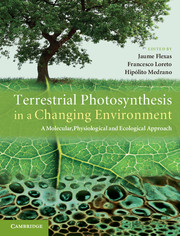 Terrestrial Photosynthesis in a Changing Environment
Terrestrial Photosynthesis in a Changing Environment Book contents
- Frontmatter
- Contents
- List of contributors
- Preface
- Acknowledgements
- List of abbreviations
- 1 Terrestrial photosynthesis in a changing environment
- Part I Photosynthesis
- Part II Measuring photosynthesis
- Part III Photosynthetic response to single environmental factors
- Part IV Photosynthesis in time
- Part V Photosynthesis in space
- 26 Whole-plant photosynthesis: potentials, limitations and physiological and structural controls
- 27 Ecophysiology of photosynthesis in the tropics
- 28 Ecophysiology of photosynthesis in desert ecosystems
- 29 Ecophysiology of photosynthesis in semi-arid environments
- 30 Ecophysiology of photosynthesis in temperate forests
- 31 Ecophysiology of photosynthesis in boreal, arctic and alpine ecosystems
- 32 Crop photosynthesis
- Part VI Photosynthesis in a global context
- References
- Index
26 - Whole-plant photosynthesis: potentials, limitations and physiological and structural controls
Published online by Cambridge University Press: 05 March 2013
- Frontmatter
- Contents
- List of contributors
- Preface
- Acknowledgements
- List of abbreviations
- 1 Terrestrial photosynthesis in a changing environment
- Part I Photosynthesis
- Part II Measuring photosynthesis
- Part III Photosynthetic response to single environmental factors
- Part IV Photosynthesis in time
- Part V Photosynthesis in space
- 26 Whole-plant photosynthesis: potentials, limitations and physiological and structural controls
- 27 Ecophysiology of photosynthesis in the tropics
- 28 Ecophysiology of photosynthesis in desert ecosystems
- 29 Ecophysiology of photosynthesis in semi-arid environments
- 30 Ecophysiology of photosynthesis in temperate forests
- 31 Ecophysiology of photosynthesis in boreal, arctic and alpine ecosystems
- 32 Crop photosynthesis
- Part VI Photosynthesis in a global context
- References
- Index
Summary
Introduction
Whole-plant photosynthesis is a complex process depending on photosynthetic activity of single leaves, plant architecture and plant biomass distribution between support and assimilative tissues. This chapter reviews the importance of whole-plant photosynthesis in ecology and plant science, the possible ways of estimating whole-plant carbon-gain rates and the determinants of whole-tree carbon gain. It further analyses the changes in whole-tree carbon gain in different environments and with plant aging and increasing size. The main message of this chapter is that whole-plant photosynthetic productivity is determined collectively by a series of physiological and structural traits, by within-canopy variation in environmental drivers and by foliage acclimation to the within-plant environmental heterogeneity. Therefore, whole-plant photosynthesis responds differently to the environment than does the sum of single-leaf photosynthetic responses.
Whole-plant photosynthesis: importance for large-scale carbon fluxes
Driven by the need to understand and predict global change, there is strong interest in determinants of vegetation carbon gain at higher scales ranging from whole plants to canopies, landscapes, biomes and globe (e.g., Williams et al., 2004; Ollinger et al., 2008; Duursma et al., 2009). There is a large variation in physiological activity among the leaves of the same plant owing to differences in leaf ontogenetic status, as well as owing to leaf acclimation to within-canopy light, temperature and humidity gradients. Because of this large variation among leaves, the whole-plant performance is difficult to assess from single-leaf measurements (Klingeman et al., 2000), and poor correspondence of single-leaf gas-exchange rates and plant growth has been observed in numerous studies (e.g., Lambers and Poorter, 1992; Lawlor, 1995).
- Type
- Chapter
- Information
- Terrestrial Photosynthesis in a Changing EnvironmentA Molecular, Physiological, and Ecological Approach, pp. 399 - 423Publisher: Cambridge University PressPrint publication year: 2012
- 10
- Cited by
